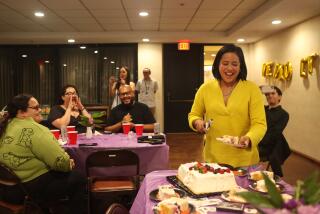Malibu Gets Early Start on Political Infighting : Government: City Council-elect is already showing deep divisions on several key issues. Members have no power until seaside community formally becomes a city.
- Share via
It has no budget, no staff and little real power, but in the three months since Malibu voters overwhelmingly approved cityhood, the seaside community’s unofficial City Council has done its best to substitute for the real thing.
In weekly sessions that last up to four hours, the five council members--elected but unable to take office until the famous coastal enclave becomes a city--wrestle with an array of problems for which there are few solutions.
A homeowner wants to know when the landslide near his house will be cleaned up. Residents complain about traffic along Pacific Coast Highway. Self-appointed community watchdogs want a say in where City Hall will be located.
The three men and two women listen dutifully, often argue among themselves, and frequently ask questions no one can answer.
At their meetings, held in a stylish auditorium at Hughes Aircraft Co.’s research laboratories high in the Malibu hills--which the company makes available free of charge--the most common phrase one hears is “after we become a city.”
As standard-bearers for a community where movie stars and ordinary retirees have linked arms to throw off the mantle of Los Angeles County government, which wants to install an unpopular sewer system there, the council members have gone from relative obscurity to household names in a few months.
With the county trying to delay incorporation until March in a bid to start work on the sewer before a new city government has the chance to block it, they are, in a sense, all dressed up with no place to go.
“We are a government-in-waiting, if you will, and while we would obviously like to jump in there and take real action on behalf of the people who elected us, we’re unable to do that,” said Councilman-elect Mike Caggiano. “It’s very frustrating.”
But one thing the council has been able to do is fight for cityhood--and in that effort it has earned high marks.
After a state appeals court in July ruled that the county Board of Supervisors had the authority to delay incorporation until March, the council-elect turned to the state Legislature.
A measure that would nullify the supervisors’ delay swept both houses of the Legislature without opposition two weeks ago. At the close of the legislative session Aug. 31, Gov. George Deukmejian had not acted on the bill. He has until Sept. 30 to do so.
Although council members have worked shoulder to shoulder against a county government that is about as popular in Malibu as a cloudy day at the beach, there are already signs of deep division on other matters.
The differences reflect a rivalry between the two slow-growth groups that spawned the community leaders who won election to the council.
Larry Wan, who finished second in the balloting, is the former president of the Malibu Township Council, the oldest residents’ group in Malibu. Two other council members--Caggiano and Missy Zeitsoff--also came from its ranks.
Walter Keller, the top vote-getter, and Carolyn Van Horn emerged from the Malibu Committee for Incorporation, which they co-chaired.
For several years, there was a tacit agreement that the Township Council would take the lead in opposing the sewer, leaving the incorporation group in the forefront of the cityhood effort.
A few months before the June election, however, the incorporation group’s leaders accused the Township Council of plotting to invade their turf. Despite private assurances of cooperation before the election, the rivalry quickly asserted itself once the council-elect began to meet.
Almost immediately, there was a bitter rift over the hiring of a city attorney. Keller and Van Horn favored Graham Ritchie, the incorporation group’s lead attorney. The other council members settled on Michael Jenkins, who is city attorney for West Hollywood and a couple of other cities.
The latest flare-up involves the choice of Keller to receive the mostly honorary title of mayor-elect.
Keller’s supporters had insisted since June that, because he won the most votes, he should be mayor. They noted that the top vote-getter was named mayor in all but one of the last dozen cities to incorporate in Los Angeles County.
When the matter was brought up at an early meeting of the council, the majority faction favored postponing a choice until after incorporation. Then, in a surprise move last week, Wan offered the motion to appoint Keller.
In the excitement of the moment, Keller and some of his supporters apparently did not notice that the motion called for him to surrender the title in April. Keller said later that he thought the appointment would last until 1992.
If the county gets its way in forcing the delay of cityhood until March, it means that the new mayor-elect may only be mayor for a few weeks.
Keller’s partisans cried foul.
“If that’s somebody’s idea of a fence-mending gesture, the fur is going to fly,” said Van Horn, who, although she voted for the appointment, has since expressed misgivings.
In their overall tone, the council sessions fall somewhere between a New England town hall meeting and a television talk show. Members of the audience sometimes shout opinions at the council, and at each other.
There is not even a gavel yet to put the budding gadflies in their place. The council members dutifully make motions, second them and take votes. Of course, they do not have a dime to spend and cannot order anybody to do anything. So the votes are largely on ministerial matters, such as sending a letter to the California Coastal Commission on the scheduling of matters that could affect Malibu.
This is the first venture into elective politics for each of the council members. Three hold doctorates: Wan, who owns a high-tech products company; Keller, a retired aerospace engineer, and Caggiano, a public policy analyst. The two others are retired schoolteachers.
Besides conflicts over the mayor and city attorney, their infighting has resulted in several stalemates.
Although actor Michael Landon has donated office furniture, there is no place to put it because the council, after weeks of bickering, only last week settled on a future city hall.
Similar disagreements have stalled efforts to hire a support staff. After much wrangling, the panel just agreed to begin contract talks with a prospective interim manager.
“There’s so much distrust between the two factions you can almost reach out and touch it,” said one community activist. “If this is a dress rehearsal, what will it be like when there really is a city?”
More to Read
Sign up for Essential California
The most important California stories and recommendations in your inbox every morning.
You may occasionally receive promotional content from the Los Angeles Times.










